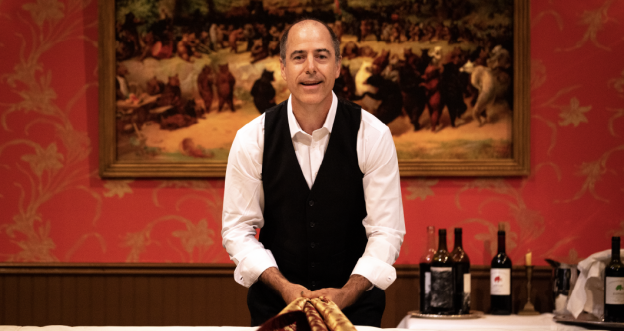Curated programmes, trusted venues, familiar artists and producers – Dorothy Max Prior plays it safe at the Edinburgh Festivals 2023
Edinburgh, August 2023. I’m standing in a queue (inevitably) waiting to go into the Main Hall at Summerhall to see a sold-out show – Laura Murphy’s Making a Spectacle of Herself. ‘It feels like we’re back to normal’ says Amy, the venues’s press officer, who is standing in the queue in front of me, ‘last year felt like a rehearsal…’ And yes, I concur – 2020 was cancelled, 2021 was a very minimal affair with hardly any shows, 2022 saw the Fringe relaunch, and 2023 feels like we’re back with a bang. Kind of.
With around 3,500 shows in the 2023 programme, the Fringe is down on its 4,000 shows plus pre-Covid record. And there have recently been calls from many quarters for the whole thing to be overhauled – with extortionate costs for accommodation and venue hire, the Fringe is just not viable for unsupported artists. Ticket prices have risen, and audiences are cautious. Artists are also wary: the old days of rocking up and taking a chance, hoping that yours will be the show that does it all – grabs the attention of the press, builds a word-of-mouth success story, fills houses, and gets the awards – is more-or-less gone. Unless you have support of some support, it’s just not feasible. At the very least, you need to have previously made and toured the show to decent venues or festivals, and hopefully garnered a few favourable reviews or accolades.
I will confess that, with no resources or financial support for Total Theatre Magazine, I’m here for a mere four days, and I am taking a cautious stance, only seeing shows that I want to see – shows that are part of a curated programme, at a venue I trust, and/or are by artists whose work I know. Maybe that’s a shame – but it’s how things are.
It was different when Total Theatre Magazine was a properly funded venture. I came to Edinburgh for the full month, my rent paid for (and even, a couple of decades back when we were an Arts Council Revenue Funded Organisation, on full pay with bonuses and expenses – those were the days!). Wearing both my magazine editor’s hat and my Total Theatre Awards judge’s wig, I saw scores of shows. I went through the Fringe print brochure (nicknamed the Edinburgh telephone directory), highlighting anything vaguely appropriate to TT. I saw shows I wanted to review, but I took a lot of chances, heading off to see shows that had a good title, or a nice photo in the brochure. I also went to see shows that had submitted themselves for consideration for a Total Theatre Award, and went to shows that the Awards producers asked me to see because assessors had differing opinions, plus making it a priority to see the whole Longlist before the TT Awards judging process began.
No more. I don’t know what will become of the Awards, but they are not happening for now – and perhaps their moment is gone. After all, we set them up to provide an alternative to the Scotsman Fringe Firsts, who wouldn’t consider the sort of mostly word-free physical and visual work we supported. But then Fringe Firsts, and Herald Angels, started going to the very same shows we awarded. And it all started to feel a little – odd. The one Total Theatre Award I do feel is unique and needs to be preserved if at all possible is the circus award, supported over many years by Jacksons Lane. This year’s offerings showed us that circus really has grown as an artform over recent decades – and I saw a fair few shows in my four-day whirlwind visit. (See the circus round-up here.)
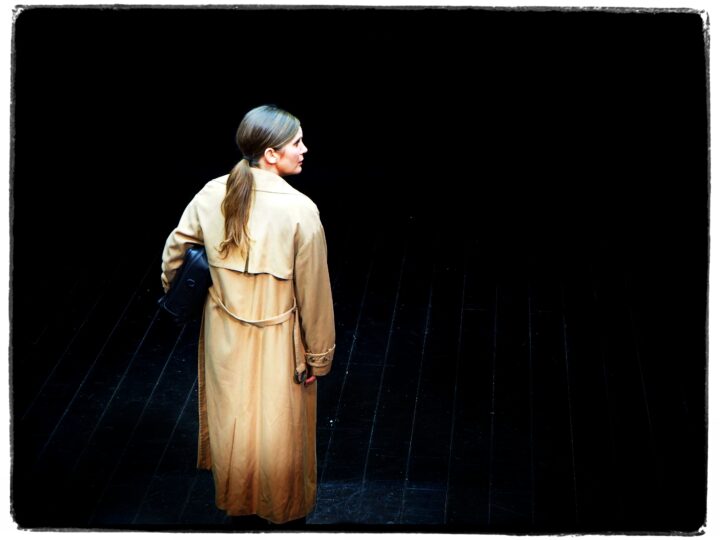
So, in my state of caution, it was good to see specific curated programmes like Big in Belgium, Start to Finnish, and Made in Scotland have survived and thrived. Inclusion in one of these programmes is some sort of guarantee of quality. So it is, with no apology, that I report back on shows that I’ve seen as part of these various curated programmes.
I’ve previously written about two of the Big in Belgium shows – Funeral by Ontroerend Goed, and The Van Paemel Family by SKaGen, here – but also part of that programme was La Codista / The Queuer, by Wunderbaum – presented, like the rest of the programme, at Zoo Southside. La Codista is a one-woman show written and performed by Marleen Scholten which uses research into the bizarre profession of being a queuer for other people – getting their prescriptions, tax office documents etc. – the resulting research generating the text of the work. It’s a good enough show, a good script, well performed, with simple but effective staging – but in the ferment that is the Edinburgh Fringe it doesn’t quite have the extra spark needed to push it forward into the glittering frontline, and perhaps suffers a little for being seen inbetween those other two totally brilliant Big in Belgium shows Funeral and The Van Paemel Family . (There is a fourth show called Sneakpeek Shadow Game, an online ‘real time digital documentary’ by SKaGen which I didn’t get to experience.)
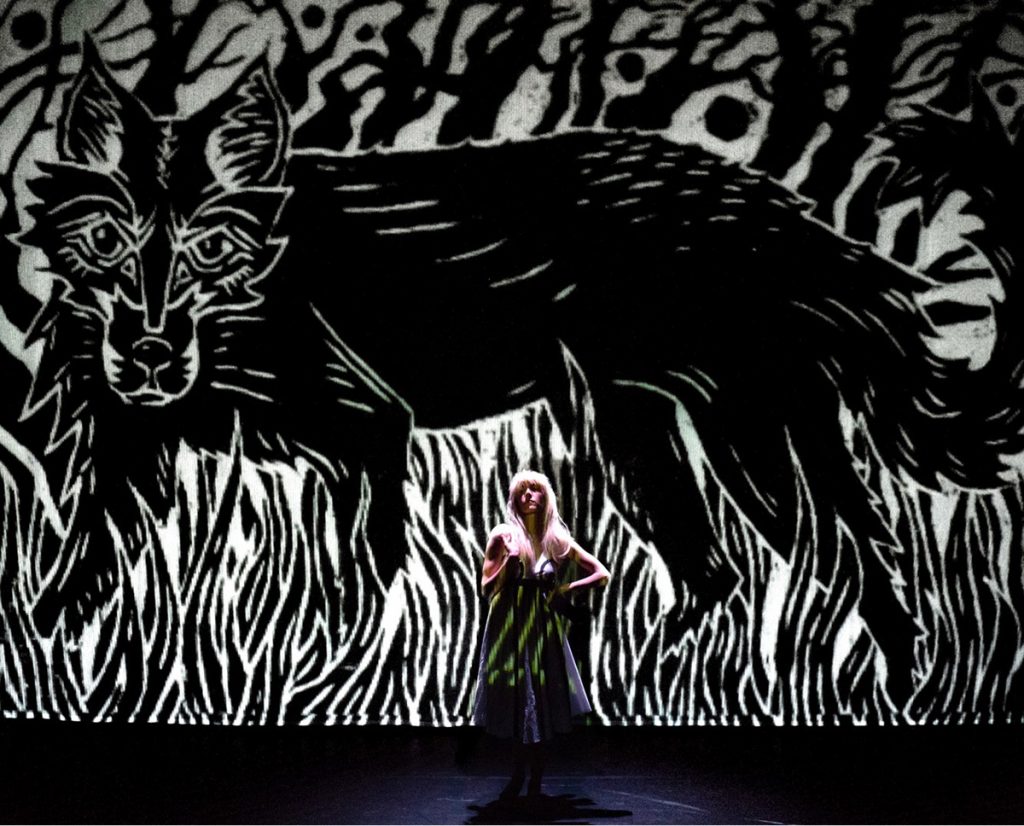
The four-strong From Start to Finnish programme included a show I’ve previously seen at Reykjavik Fringe (and can highly recommend), Them by Spindthrift Theatre. There’s also a show I would have loved to have seen but just couldn’t fit in, Chevalier Hobbyhorse Circus by the brilliant Race Horse Company, nominated for a Total Theatre Award in 2019 for Super Sunday; and two shows I knew nothing about.
So I took a chance on one of those – Insomniac’s Fable by Agit-Cirk, a ‘delicate story with a Hitchcockian glint in its eye’, merging juggling and ballet. Of course, Gandini Juggling has set a high benchmark for work exploring the juggling-dance dynamic, but Insomniac’s Fable is its own thing, and was worth the gamble.
The start is a little shaky – in the first scene, to the tune of ‘Dream a Little Dream of Me’, boy meets girl, and he juggles whilst she dances, but the interaction is token. As we move deeper into the dreamscape, with the addition of some interesting lighting states, some good shadowplay and use of scale, and some rather lovely projections of folkloric lino-cut images (sleeping wolf, tangled trees, a lighthouse on a cliff, a girl gazing over the sea into the horizon), the piece gets stronger. And the dance and juggling become more integrated. In one scene, the girl is manipulated by red ribbons tied to her limbs, so she becomes a marionette. In another scene, the girl dances to a raunchy blues number, using the boy’s juggling hoops as if they were feathery burlesque fans, then finds herself trapped in hoop ‘leg irons’. The metaphors are clear – he longs to own and command, she constantly pushes away and flies off. A little old-fashioned on the sexual politics, then – but Insomniac’s Fable is promoted as a surrealist exploration of dream and fantasy, so maybe that’s OK! An enjoyable hour of physical and visual storytelling.
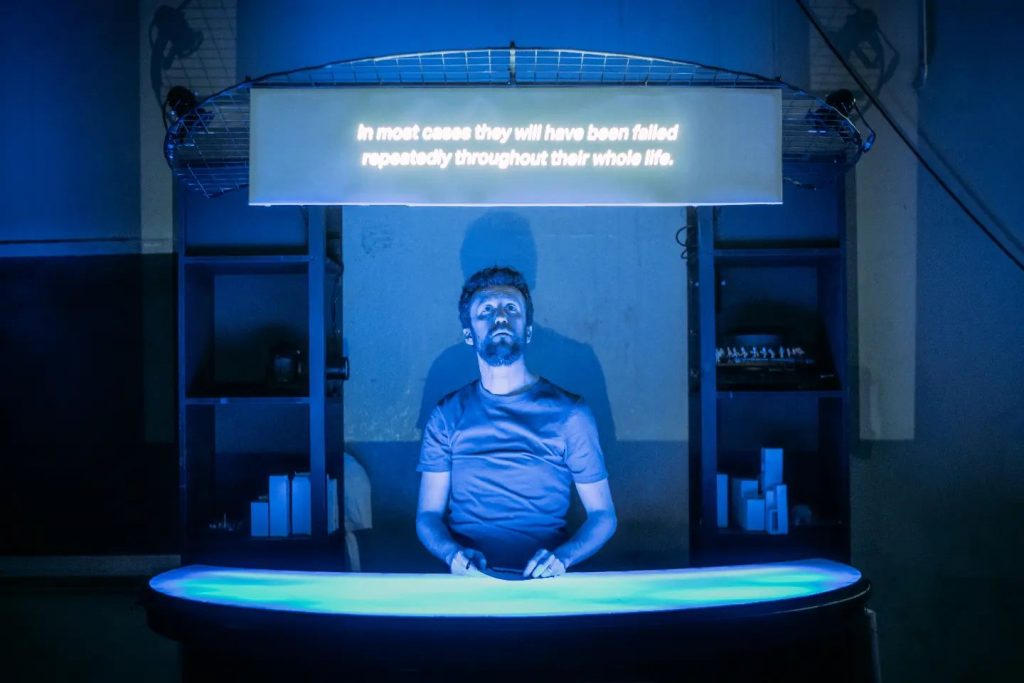
Tortoise in a Nutshell’s Concerned Others is presented as part of Made in Scotland – another curated programme within the Fringe. It is an intimate tabletop performance that takes as its starting point the harrowing fact that Scotland has the highest rate of drug-related deaths in Europe. It uses verbatim texts by doctors, patients and family members gathered up in their research process. These recorded texts are paired with a raft of visual theatre devices: the company’s trademark miniature worlds manipulated by the lone performer (company co-founder Alex Bird), puppetry and mask work, and object animation with live-feed video of some every lovely shoebox installations. It’s another show that starts a little weakly, with the miniature world of tiny figures feeling a little bit superfluous to the verbatim texts which are (and perhaps there’s no avoiding this) commanding the space, and are all pretty dour and depressing. But later, it goes deeper in, and the visual theatre takes the upper hand – I love the little shoebox rooms in particular. There’s one that gives us the perfect dolls house sitting room: velvet couch, standard lamp et al. ‘Did you expect peeling wallpaper and damp?’ says the recorded female voice, talking of her teenage child’s addiction, and the surprised response of the social worker who saw that she came from what might be called a ‘nice’ home. There is, inevitably, the question of who this sort of issue-based theatre work is for. I doubt if the educated art-loving audience here at Summerhall learnt anything that they didn’t know about drug addiction. I personally didn’t – although I was pleased on two counts: that alcohol was included as a killer addiction (with a nice video montage of TV beer ads); and that the piece ended on a note of hope. People do escape this hell…
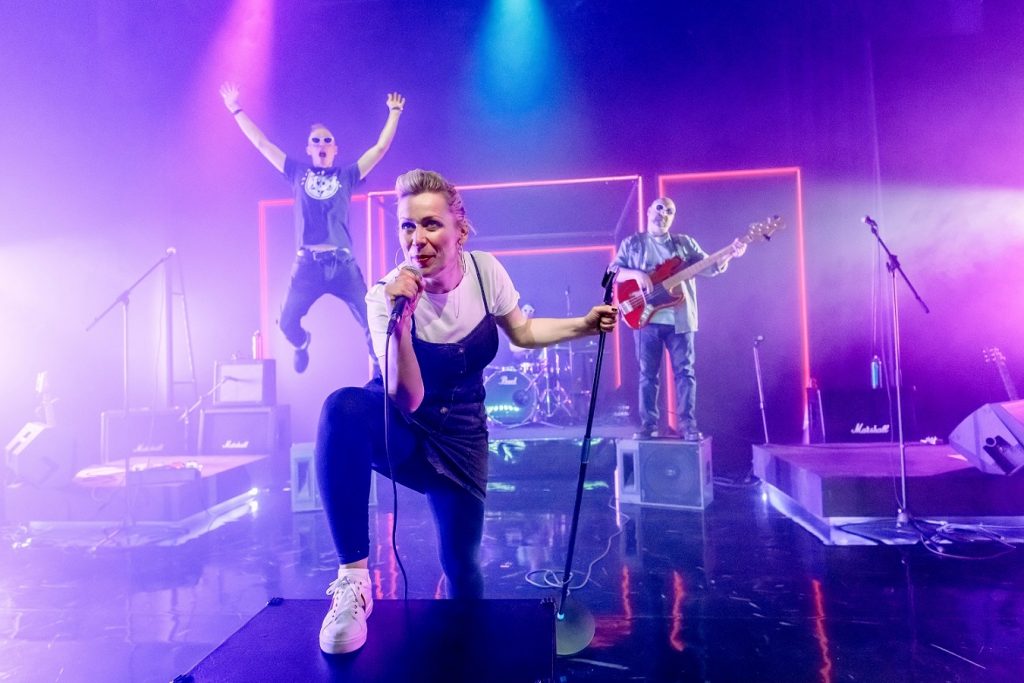
Also part of Made in Scotland comes What Girls Are Made Of , the smash-hit, gig-theatre show that charts the true story of Cora Bissett’s ‘rollercoaster journey from 90s indie-kid to wised-up woman’. It’s not a new show – it won a Herald Angel and a Fringe First in 2018 – but I hadn’t seen it before, and people keep telling me I should – me a being a post-punk drummer in the 1970s and 1980s and all that.
Here’s the blurb: ‘It’s 1992. In a small town in Fife, a girl is busting out of her skin to get out into the world and see what’s on offer. And an ad in the local paper declares: Band Seeks Singer…’ Thus, a schoolgirl from Glenrothes is catapulted to a rock-star lifestyle as the singer in a hot new indie band called Darlingheart. ‘Touring with Radiohead, partying with Blur, she was living the dream. Until she wasn’t…’
It is written and performed by Cora Bissett (who won a Total Theatre Award for Roadkill), the text based on her own teenage diaries, and the show framed nicely by the story of clearing out the family home and finding the diaries in a box in the loft, wedged in between the wedding photos and significant birthday cards. It is performed with a punchy upbeat energy, even through the difficult scenes, deftly directed by Orla O’Loughlin, and features a live band (with a female drummer – oh yes!) who also multi-task as various characters in the story.
And yes, it’s an enjoyable ninety minutes, and I’m glad I’ve finally seen it – but I did find it hard to relate to. It seems that all the work we did with punk in the 1970s – which saw a real revolution, women joining and fronting bands left right and centre – had somehow, by the 1990s, gone back to the pre-punk crappy world of female musicians in general, and lead singers in particular, preyed upon and exploited by managers, A&R men, journalists, and record company executives. Good God, what is all this nonsense? It’s heartbreaking.
But I liked the homage to Patti Smith (‘I didn’t know if I was in love with her or wanted to be her’ says Cora) and the Horses motif that runs through the show, Cora casting herself as a sturdy Shetland pony. I enjoyed the stories about her large-handed, nurturing dad and the mum who had herself nursed dreams of being a singer. I like the schooldays stories – with characters like hard-nut Caitlin, and the girl that nobody speaks to because she smells, drawn well as little cameos. The story doesn’t end with the band – there’s Cora’s time as a folksy alternative singer, a spell at drama school, making theatre, meeting her soul mate, and having a baby all coming into the tale – but unlike the evocations of her childhood and adolescence, this all feels truncated, squeezed into the narrative to wrap things up nicely and give the show a feel-good upbeat ending. I’d have found it stronger if it had stayed with the childhood and coming-of-age story.

Also autobiographical, in part anyway, the Aurora Nova produced Night Soles sees theatre director and designer Thaddeus McWhinnie Phillips with a story about a Wyoming tap dancer who is stranded in Cuba. Using an interesting combination of tap dancing, shadowplay, and object theatre we meet the performer’s own tap teachers, including a grandmother who was Donald O’Connor’s teacher, and later danced with him on the vaudeville circuit. This moves us into a tap dance on a table that references O’Connor’s legendary table-top duet with Gene Kelly in Singin’ in the Rain. The table is used later in a scene where Phillips (revisiting working as a waiter) taps his way along a line of percussive plates. Elsewhere, a locker decorated with old cabaret and movie-star photos and flyers (including one for cat boxing, a reference that goes over my head!) turns into a pool table. Vintage tunes are played on a tinny dansette record player; and a shadow theatre scene plays out behind clothes pegged on a washing line. It’s a show full of vivid pictures in endearing scenes, driven by the scenography (as befits a performer who is also a designer), with a strong physical performance from this lone actor-dancer who seems equally at home dancing, reminiscing and slipping into the skin of other characters (his Cuban accent sound pretty authentic to me!). But somehow it all feels a little less than the sum of its parts… I think because previous Thaddeus Phillips productions seen at Ed Fringe – 17 Border Crossings and Inflatable Space – were so very good, so beautifully constructed with such strong dramaturgy, that expectations were high. These two were great shows – and Night Soles is merely a good show. It’s a tough environment in Edinburgh, particularly when you are in competition with your own past successes!

Also a one-man show, and also using tables and objects to tell stories, comes Geoff Sobelle with Food – the only Edinburgh International Festival (EIF) show I catch on this trip. Geoff is also part of the Aurora Nova stable – and indeed a Fringe veteran. I first saw him many years ago in the days when Aurora Nova had their own venue at St Stephen’s Church, where he was performing as one half of Rainpan 43 in the utterly brilliant All Wear Bowlers which honours both vaudeville and silent movies. He then went on to collaborate with Charlotte Ford in the Total Theatre Award winning Flesh and Blood & Fish and Fowl – an almost word-free play in which the human world gets hijacked by nature.
And there are echoes of these and other earlier works in Food: specifically, the deft clowning, the absurdism, the love of magic and illusion, and the ongoing interest in how humans inter-relate with whatever environment they find themselves in. For EIF, Geoff has previously presented HOME and The Object Lesson, Food being the third in a trilogy rooted in a desire to explore the 21st century human condition, and to place the audience in the centre of the fabric of each show.
As with these earlier works, illusion, installation and home-spun mechanics are all used to create a fabulous environment. In this case, it’s a dinner party, set round an enormous table. There is audience on three sides, and a backdrop of flock wallpaper and an oil painting. There’s an enormous white cloth, and a red satin runner; plates and cutlery and glasses. Geoff Sobelle is our waiter, serving wine and giving out menus. The piece starts slowly (a little too slowly and shakily for me) with audience members invited, via codes on the menus, to share memories of food and drink consumption and cooking. Maybe I hit a bad night, but the stories we got were all pretty dull – tedious holiday memories or, ‘Er, I can’t really remember’ responses that made me squirm a bit.
But never mind – in the next section, things pick up, as different people are prompted to put in their orders. Things get more and more surreal – a bowl of apples or a portion of rice, but also a dish of raw eggs and, in the first of many magical transformations, the lighting state shifts to an icy blue and the white table becomes into an Arctic landscape, our intrepid explorer cutting a circle in the ice and plunging his arm down into the water to capture a slippery fish, delivered wriggling on its plate to the diner. We move away from audience interaction for a while as Sobelle proves his worth as a top-notch clown and magician in a fabulous scene of Gargantuan greed – every single thing to hand seemingly devoured as he moves from one apple to the whole bowl, to the raw eggs, the many platters of rice, and numerous bottles of wine – the lot. Another fabulous transformation as the massive tablecloth and everything on it (including somebody’s mobile phone – that’ll learn ’em) is whisked away to reveal an earthy landscape. Bison roam, grains sprout, tiny tractors are handed to audience members to manipulate. Another hole is dug, and this time it’s oil, not fish, that comes out. Cue the arrival in the landscape of oil rigs and tankers and houses and garages and stores. By now, we are all engaged – building towns and moving trucks around the space.
The piece ends on a litany. An audience member (me, as it happens!) finds her head and neck gently embraced by Geoff’s hands. ‘Is this OK?’ he quietly asks, and I nod. It turns out that his fingers are loaded with something (working a bit like Bluetooth bud speakers, I suppose) that convey a female voice into my ears – a voice that only I can hear. ’Please repeat what I say,’ says the voice, ‘and don’t worry if you get things wrong’. Millet, barley, corn, wheat, she says, and I say. Later, we’ve moved on to cucumbers, Krispy Kremes, and kumquats.. All the things we’ve hunted and grown and picked and made and marketed and transported across the world. Eaten and digested, discarding what we don’t have a use for. Bison and birds, fish and fowl, quinoa, and Coca Cola – it’s all here.
Food for thought indeed – and another brilliant success for the legendary Geoff Sobelle, who ‘began as a magician, continued as an actor and arrived as a clown’. All of those things are in ample evidence here.
Featured image (top of page) Geoff Sobelle: Food
Geoff Sobelle: Food was seen in The Studio, 9 August 2023, as part of the Edinburgh International Festival 2023. www.eif.co.uk
All other shows presented at the Edinburgh Festival Fringe 2023www.edfringe.com
Wunderbaum / Marleen Scholten: La Codista / The Queuer was seen at Zoo Southside as part of Big in Belgium, 8 August 2023
Agit-Cirk: Insomniac’s Fable was seen at Summerhall as part of Start to Finnish, 10 August
Tortoise in a Nutshell: Concerned Others was seen at Summerhall as part of Made in Scotland, 9 August 2023
Cora Bissett: What Girls Are Made Of was seen at Assembly Rooms as part of the Made in Scotland programme, 10 August 2023
Thaddeus McWhinnie Phillips: Night Soles, produced by Aurora Nova, was seen at Assembly Roxy, 7 August 2023

